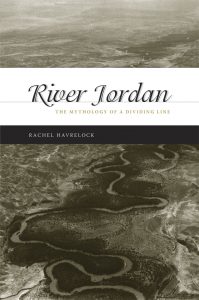Rachel Havrelock on the Sykes-Picot Agreement for Foreign Affairs

The Sykes-Picot Agreement, ratified on May 16, 1916, was a concord developed in secret between France and the UK, with acknowledgement of the Russian Empire, that allocated control and influence over much of Southwestern Asia, carving up and establishing much of today’s Middle East, along with Western and Arab sociopolitical tensions. The real reason for the divide? The region’s petroleum fields, and the desire to share in its reserves, but not its pipelines. Rachel Havrelock’s book River Jordan: The Mythology of a Dividing Line considers the implications of yet another border in the region, the river that defines the edge of the Promised Land in the Hebrew Bible—an integral parcel of land for both the Israeli and Palestinian states. With her expertise in the ideologies that undermine much cartography of the region (her book includes a map of the Sykes-Picot Agreement’s splitting of territories), Havrelock understands how the demarcation of influence was central to the production of very specific oil-producing nation states.
In a recent piece for Foreign Affairs, appearing a century after the Sykes-Picot Agreement, Havrelock writes about the potential for the region to remake itself, in the self-image of its peoples and their local resources:
The dissolution of oil concessions could hold the key to this transformation. Consider the Kurdish case. Following the Second Gulf War, private oil companies flocked to Iraq. Iraq’s national oil company reserved the right to pump existing wells with partners of its choosing, but local bodies such as the Kurdistan Regional Government were allowed to explore new wells and forge their own partnerships—a boon to the Kurdish economy.
Kurdish oil shares made all the difference when ISIS emerged in 2014. The largely effective Kurdish Peshmerga fight against ISIS owes to Kurds’ desire to protect not just their homeland but also the resources within it. Kurds harbor longstanding desires for autonomy, but their jurisdiction over local oil is a form of sovereignty—over resources rather than territory—that models a truly post‑Sykes–Picot Middle East. Because Sykes–Picot divided territory in the name of extracting and transporting oil to Europe, reforming the ownership of oil is the first step in dissolving the legacy of colonial administration and authoritarian rule.
Ideally, people across the Middle East should hold shares in local resources and have a say in their sale, use, and conservation. In an age of increased migration, this principle could help people inhabit new places with a sense of belonging and stewardship. Of course, local officials will still need to partner with global firms to drill, refine, and export oil, but such contracts will work best when driven by local needs rather than corporate profits. The Kurdish case proves that local stakeholders will raise an army where oil companies will not.
To read Havrelock’s piece in full at Foreign Affairs, click here.
To read more about River Jordan, click here.